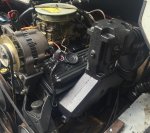ukstu
Seaman
- Joined
- Nov 25, 2018
- Messages
- 54
Hi all,
I have read this forum for some time but never registered so first off, apologies for the first post being to ask for help.
I currently have a Mercruiser 5.7 V8 with Alpha one (1989-92). I have had this engine for coming up 5 years.
I have had an issue with moisture in the oil for a while, i put it down to condensation as the only trace was in the rockers, not so much the oil in the sump. (there was however a fair bit in the oil this time when i emptied it).
I have had both heads off over the last year or so and had them skimmed, valves re-seated and a couple of new seats etc. I am fairly confident that both heads are fine.
When i re-built at the start of this year compression on all cylinders was good.
The boat has now come out of the water for the winter and i have just serviced and winterized it. After running up on antifreeze i removed all plugs to fog and thought i would so a compression test just for peace of mind.
Here is where the surprise came.
I found that when i turned the engine over for the compression test i had antifreeze coming out of Cylinder 2, alot of it. and the compression readings were:
180 - 8 7 - 175
60 - 6 5 - 170
165 - 4 3 - 0
130 - 2 1 - 180
My thoughts are that compression is generally good in most cylinders but the following has stumped me:
Cylinder 2 - how can there be compression when it has a leak into it?
Cylinder 6 - Does this point towards the head gasket?
Cylinder 3 - How can this have nothing at all?
The boat 'seemed' to be running fine with no issues throughout the season. Are there any known 'bad' head gaskets out there? any to avoid? Seems odd that a head gasket would have failed so quickly..?
I hope that all makes sense.
Any advice anyone could offer would be gratefully received.
I have read this forum for some time but never registered so first off, apologies for the first post being to ask for help.
I currently have a Mercruiser 5.7 V8 with Alpha one (1989-92). I have had this engine for coming up 5 years.
I have had an issue with moisture in the oil for a while, i put it down to condensation as the only trace was in the rockers, not so much the oil in the sump. (there was however a fair bit in the oil this time when i emptied it).
I have had both heads off over the last year or so and had them skimmed, valves re-seated and a couple of new seats etc. I am fairly confident that both heads are fine.
When i re-built at the start of this year compression on all cylinders was good.
The boat has now come out of the water for the winter and i have just serviced and winterized it. After running up on antifreeze i removed all plugs to fog and thought i would so a compression test just for peace of mind.
Here is where the surprise came.
I found that when i turned the engine over for the compression test i had antifreeze coming out of Cylinder 2, alot of it. and the compression readings were:
180 - 8 7 - 175
60 - 6 5 - 170
165 - 4 3 - 0
130 - 2 1 - 180
My thoughts are that compression is generally good in most cylinders but the following has stumped me:
Cylinder 2 - how can there be compression when it has a leak into it?
Cylinder 6 - Does this point towards the head gasket?
Cylinder 3 - How can this have nothing at all?
The boat 'seemed' to be running fine with no issues throughout the season. Are there any known 'bad' head gaskets out there? any to avoid? Seems odd that a head gasket would have failed so quickly..?
I hope that all makes sense.
Any advice anyone could offer would be gratefully received.




















